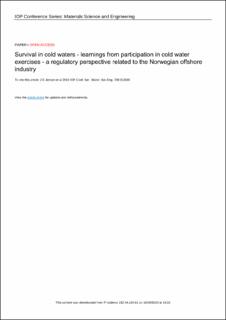| dc.contributor.author | Jensen, Jan Erik | |
| dc.contributor.author | Solberg, Knut Espen | |
| dc.contributor.author | Gudmestad, Ove Tobias | |
| dc.date.accessioned | 2020-11-23T10:11:54Z | |
| dc.date.available | 2020-11-23T10:11:54Z | |
| dc.date.created | 2019-12-05T13:07:58Z | |
| dc.date.issued | 2019 | |
| dc.identifier.citation | Jensen, J.E., Solberg, K.E., Gudmestad, O.T. (2019) Survival in cold waters - learnings from participation in cold water exercises - a regulatory perspective related to the Norwegian offshore industry. IOP Conference Series: Materials Science and Engineering, 700 (1). | en_US |
| dc.identifier.issn | 1757-8981 | |
| dc.identifier.uri | https://hdl.handle.net/11250/2689038 | |
| dc.description.abstract | Participation in exercises lead by the University of Stavanger, the SARex 1 in 2016 and SARex 2 in 2017, provided valuable lessons related to survival in a cold maritime environment. The scenario of the exercises was a mass evacuation from a stranded cruise ship in Arctic waters but provided experiences relevant beyond the cruise industry. This article focuses on the relevance for the oil and gas industry in the Norwegian sector. SARex 1 and 2 were rescue exercises carried out north of Spitzbergen by industry, regulators and academia during the spring of 2016 and 2017. The Norwegian Coast Guard, the University of Stavanger and GMC, Stavanger, organized the exercises. The Petroleum Safety Authority found it important to participate in SARex 1 and 2, to better understand the factors enabling success in a cold climate survival situation. The survival tests in lifeboats and life rafts during SARex 1 and 2 showed the necessity of having trained and competent leadership on board. This issue has perhaps been neglected, compared to the development of equipment to ensure successful evacuation and avoid hypothermia. Some key factors for survival success were (1) Functioning of emergency equipment (2) Organising and teaching the function of various items of safety equipment (3) Operating evacuation means at sea, e.g. watch routines, operating hatches/venting routines and (4) Activities and maintaining mental awareness and motivation. The overall learning from SARex 1 and 2 is that survival is dependent on active participation from the survivors. There is a need for sufficient competence amongst personnel to micro-manage all the details required for survival. The mental factors following fatigue and seasickness, in addition to hypothermia, make leadership and competence in a cold maritime climate essential for survival. | en_US |
| dc.language.iso | eng | en_US |
| dc.publisher | IOP Publishing | en_US |
| dc.rights | Navngivelse 4.0 Internasjonal | * |
| dc.rights.uri | http://creativecommons.org/licenses/by/4.0/deed.no | * |
| dc.subject | offshore | en_US |
| dc.subject | redning | en_US |
| dc.subject | overlevelse | en_US |
| dc.subject | SARex | en_US |
| dc.title | Survival in cold waters - learnings from participation in cold water exercises - a regulatory perspective related to the Norwegian offshore industry | en_US |
| dc.type | Peer reviewed | en_US |
| dc.type | Journal article | en_US |
| dc.description.version | publishedVersion | en_US |
| dc.subject.nsi | VDP::Teknologi: 500::Marin teknologi: 580::Offshoreteknologi: 581 | en_US |
| dc.source.pagenumber | 14 | en_US |
| dc.source.volume | 700 | en_US |
| dc.source.journal | IOP Conference Series: Materials Science and Engineering | en_US |
| dc.source.issue | 1 | en_US |
| dc.identifier.doi | 10.1088/1757-899X/700/1/012045 | |
| dc.identifier.cristin | 1757141 | |
| dc.source.articlenumber | 012045 | en_US |
| cristin.ispublished | true | |
| cristin.fulltext | postprint | |
| cristin.qualitycode | 1 | |

